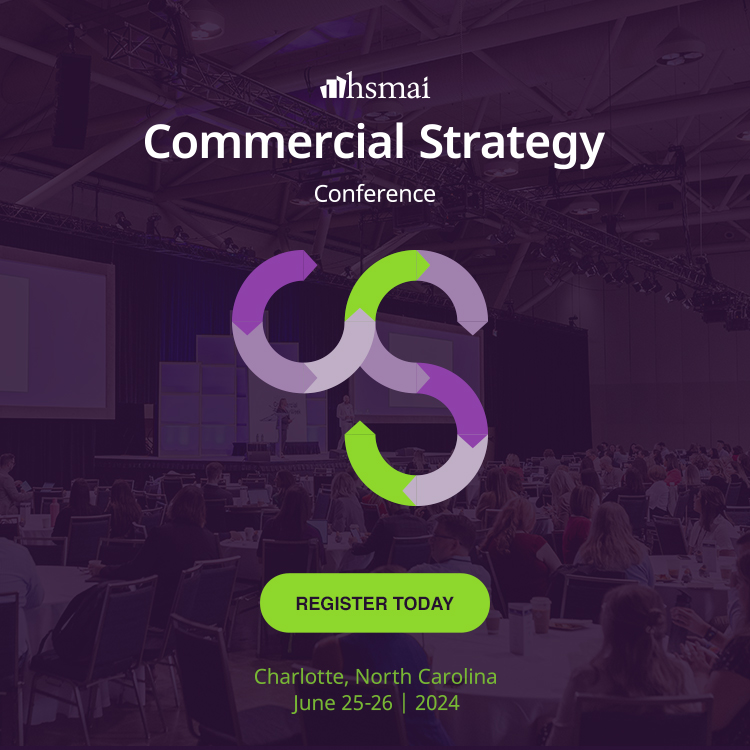 HSMAI Staff recently had the opportunity to chat with David C. Edelman, a speaker at the HSMAI Commercial Strategy Conference, June 25-26 in Charlotte. David is author of the upcoming book, Personalized: Customer Strategy in the Age of AI, and is a sought-after advisor on digital transformation and marketing. As CMO, David guided Aetna (now part of CVS Health) through becoming a digitally oriented, customer-centric brand. Repeatedly recognized by Forbes as one of the “Most Influential CMOs in the World,” and by AdWeek as one of the “Top 20 Marketing and Technology Executives,” his work has attracted over 1.1 million followers to his LinkedIn blog. Currently, David teaches Marketing at Harvard Business School and advises CEO’s and CXO’s in Health and Marketing Services, focusing on AI and personalization.
HSMAI Staff recently had the opportunity to chat with David C. Edelman, a speaker at the HSMAI Commercial Strategy Conference, June 25-26 in Charlotte. David is author of the upcoming book, Personalized: Customer Strategy in the Age of AI, and is a sought-after advisor on digital transformation and marketing. As CMO, David guided Aetna (now part of CVS Health) through becoming a digitally oriented, customer-centric brand. Repeatedly recognized by Forbes as one of the “Most Influential CMOs in the World,” and by AdWeek as one of the “Top 20 Marketing and Technology Executives,” his work has attracted over 1.1 million followers to his LinkedIn blog. Currently, David teaches Marketing at Harvard Business School and advises CEO’s and CXO’s in Health and Marketing Services, focusing on AI and personalization.
Read on for our Q&A with David.
Q: Could you give us a brief overview of your session at the Commercial Strategy Conference and what attendees can expect to learn or experience?
A: There is a tremendous amount of hype about AI and many executives don’t know where to begin. I’ll be talking about the opportunities from AI in general, how to put together a strategy to use them to drive the business at scale, and how to create a strategy to embed AI to drive scaled impact. Attendees can expect to learn a framework for understanding what AI can do, how to start thinking about the priorities for where to focus investments in AI, and tangible ideas and examples of tools that they might want to explore that could help them on their AI journey.
Q: What unique perspective or insights do you bring to this topic, and why is it important for today’s hospitality commercial professionals?
A: AI can be used for both efficiency and growth in the hospitality industry. From an efficiency standpoint, hospitality generates a lot of content and has a lot of marketing activity going on at many different phases of a customer’s journey. Much of this can now be automated, tracked, measured, tested, and constantly improved. From a growth standpoint, the main way to unlock growth from AI is through personalization, by being dramatically more relevant to each person. AI can allow you to do this by doing the modeling that can help you understand the right trigger for when somebody should be getting some kind of content, the generation of different options for what that content should be, and then for managing the testing and optimization of that overtime.
Q: What are the practical takeaways attendees will be able to implement after attending your session?
A: Attendees will come out of his session with a few practical takeaways that they can implement. These include:
- A framework for understanding what AI can do, that they can share with their teams and use in their companies.
- An understanding of how to start thinking about the priorities for where to focus investments in AI.
- Tangible ideas and examples of tools that they might want to explore that could help them on their AI journey.
Q: Could you hint at any future trends or predictions you’ll be discussing in your session?
A: There is real value that can be obtained from where AI is, and that it’s been around for a while, though some of the newer genAI tools have only been around for at scale for 18 months or so. Other forms of machine learning have been around for a while and companies are already using those to drive serious results.
AI is going to improve, but companies need to create the right kind of infrastructure, operating model, and data capabilities to support AI wherever it’s going, because it’s always learning from data.
Q: For those looking to deepen their understanding or application of your session’s insights, what resources would you recommend?
A: There’s so much out there, but an easy place to start would be the articles I’ve published in the Harvard Business Review:
- The Six Ways that AI Will Disrupt Your Business
- Customer Experience in the Age of AI
- Branding in the Digital Age
- Competing on Customer Journeys
Q: What else should leaders be considering?
A: AI strategy has to come down from the top and it’s a top leadership issue. It can’t just be little experiments that are happening. Top leadership teams need to spend the time and think about it through a workshop or series of exercises. They need to take the learning and the potential and turn it into a real plan for how they want to proceed. It does not happen organically; it must be deliberate.
